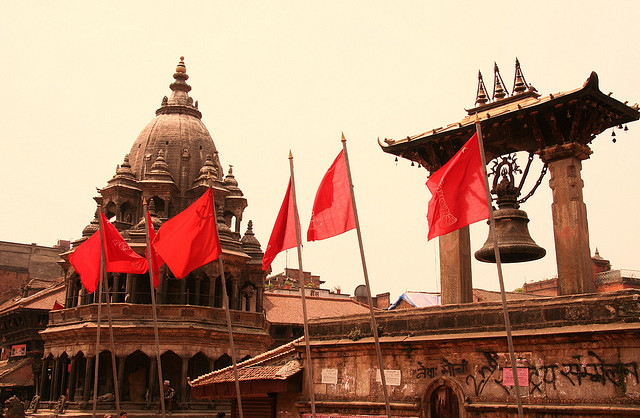Every Friday night thousands of backpackers, suburbanites and college students stream into Chabad Houses from Columbus to Cambodia. But before Chabad emissaries can clank their glasses of Johnnie Walker to a “gut Shabbos,” they have to learn where to find kosher meat at the local Kroger, or master the art of bartering for vegetables at a chaotic bazaar. In “Kathmandu,” an Israeli TV that saw a May debut, creator Esther Vender provides viewers with an intimate look at the challenges – and sometimes ludicrous scenarios – Chabadniks encounter in the most far-out locales.

The show opens as Shmulik and Mushkie, fictional Chabad emissaries in Kathmandu, Nepal, arrive in the city 48 hours before the Passover Seder. The pair are energized and inspired to work with the hordes of Israeli backpackers passing through on their way to the Himalayas. But the couple’s excitement quickly turns into fear and doubt as a series of unexpected challenges put their Seder in danger. Unable to locate the key to their rented house, Shmulik tries to break in through a window, and ends up being mistaken for a thief and thrown in jail.
“Kathmandu” enchants by throwing its sympathetic characters into comical circumstances. What makes “Kathmandu” a hit is that these amusing situations actually happen in places frequented by Israeli backpackers in Asia. Two weeks ago in the Indian city of Varanasi, a 10-year-old boy spotted my Jewfro curls and mock Tevas, asked if I was Israeli and blurted out “Shalom, Shalom!” before he even got an answer. The previous day, a shopkeeper started speaking to me in perfect Hebrew for 10 minutes after he spotted me taking a picture of a Hebrew sign advertising his store.
On the show itself, when a street vendor learns Mushkie is from Israel, he breaks into a rehearsed Hebrew monologue, introducing himself as “Ani Rani” (“I am Rani”) and calling Mushkie a motik (think “sweetie”). Despite being the newest residents of Kathmandu, they are still viewed as outsiders by locals. Rickshaw drivers charge them 200 rupees for two-second trips and taxi drivers laugh after hearing about the couple’s plans to permanently settle in the city.
Halfway through the first season Mushkie confides to Shmulik that she doesn’t think she has the endurance to survive long-term in Kathmandu. Like Mushkie, the first few weeks I was in Mumbai, I didn’t think I could live here.
I learned how to navigate streets littered with the occasional cow patties and shredded mouse carcasses, and to bargain with cab drivers. It took time to deal with the auto rickshaws clapping their hands in my face for money. Also an ordeal was getting comfortable on the train system. (Watch this video to learn why.) Now the other exchange students and I now jokingly tell each other: As grizzled veterans of living in Mumbai, after living here, we can do anything.
Shmulik and Mushkie’s Chabad house is a haven for trekkers, while the Mumbai branch is what my friend who works in the industry calls a “social club for diamond merchants.” India is a major center of the global diamond industry; Mumbai has the largest trading facility in the world. Case in point: Two months ago one of the most powerful men in the diamond industry, Martin Rappaport, was at Chabad for Shabbat dinner. A fair share of Israeli trekkers and business travelers pass through, along with the occasional European.
Unlike Kathmandu, however, Mumbai does have a substantial Jewish community. A few thousand Indian Jews live here. Their ancestors arrived thousands of years ago, and have lived on the nearby Konkan coast for thousands of years. There are small Jewish villages on the coast, an hour boat ride from Mumbai. The community members have been tremendous hosts, including me in dinners and social gatherings, and giving me a family feeling thousands of miles away from home.
One thing I have had limited contact with is the Israeli backpacker culture that exists in the Far East: a big part of “Kathmandu.” Tomer, a trekker/stoner that Shmulik first meets in jail, becomes a trusted aide to the couple by doing everything from helping Mushkie with meal preparations, to accompanying Shmulik on a mission to the mountains to search for another backpacker. The couple quickly become surrogate parents and trusted allies of the trekkers as Shmulik officiates Kathmandu’s first Jewish wedding. I’ll be able to report more on the accuracy of the show’s portrayal of backpacker culture in a few weeks, after my own trip to Nepal.
A fault of the show, however, is its tendency to create intriguing story lines and then let them stagnate. In the first episode we meet Giani (actor Liron Levo), an Israeli innkeeper who has lived in Nepal for the past thirteen years. In the first episode, we learn Giani rarely speaks Hebrew, even with his Israeli customers. As the season continues, information about Giani is slowly (emphasis on slowly) revealed. Even so, what does emerge is not enough to satisfy viewers. Answers as to why Giani first traveled to Nepal and why he decided to stay are never remotely addressed.
The same thing happens with Yamit (former beauty queen Gal Gadot), who emerges in the third episode as she searches for a missing sister. Yamit’s quest and Giani’s self-imposed isolation are neglected in favor of developing a romance between the two. The pair has chemistry, no doubt, but their back stories are too interesting to be neglected for nearly half the season, especially in exchange for a budding love story.
Actors Michael Moshonov (Shmulik) and Nitzan Levartovsky (Mushkie) avoid the trap of allowing their characters to become flat caricatures by making them raw and flawed. In real life, Chabadniks are often stereotyped as plastic and perky, but each lead shows that beneath the cheerful facades, shluchim wrestle with the same questions of doubt that plague all of us. More importantly, the leads succeed in creating genuine chemistry with each other.
What makes “Kathmandu” a success is its expert fusion of the zany situations in far flung places, held together with genuine characters. Viewers will have a new appreciation for the challenges Chabadniks encounter – and perhaps scramble to their computers to book tickets to the show’s namesake.
To watch all 13 episodes from the first season of “Kathmandu” go tohttp://bit.ly/SCxT8a. All episodes are available with Hebrew subtitles.

